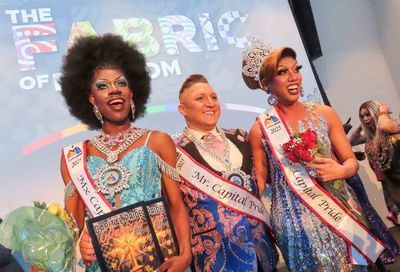Anti-gay group asks Supreme Court to overturn New Jersey’s ban on conversion therapy
Right-wing legal Liberty Counsel argues that bans on conversion therapy, like New Jersey's, violate free speech

A prominent anti-LGBTQ religious group is seeking to overturn New Jersey’s ban on conversion therapy and other similar bans throughout the country.
Earlier this month, Liberty Counsel submitted a petition for a writ of certiorari to the U.S. Supreme Court on behalf of two therapists, The Alliance For Therapeutic Choice and Integrity (previously known as the National Association for Research and Therapy of Homosexuality, or NARTH), and the American Association of Christian Counselors.
The petition asks the Supreme Court to reconsider the 3rd U.S. Circuit Court of Appeals’ ruling that upheld New Jersey’s law prohibiting licensed counselors from subjecting clients under the age of 18 to conversion therapy. The high court previously rejected a similar challenge in 2015.
In its petition for cert, Liberty Counsel argues that the ban violates the free speech rights of counselors who believe conversion therapy works in eliminating feelings of same-sex attraction or gender dysphoria.
Liberty Counsel has based its argument on a U.S. Supreme Court decision issued last year, which found that a California law that required crisis pregnancy centers — which are typically not medically licensed, and are designed to encourage women to bring their pregnancies to term — to provide pregnant women with scientifically accurate information about their pregnancies, including the availability of abortion services.
In its decision, the Supreme Court found that California’s law violated the First Amendment rights of crisis pregnancy center owners and employees, who are exercising free speech by sharing their views opposing abortion, and — because many of them are not licensed professionals — are not bound by an official code of medical ethics.
In its lawsuit against New Jersey’s ban, Liberty Counsel claims that licensed medical professionals who believe that conversion therapy works are being prevented from practicing as they see fit or helping patients who wish to change their sexual orientation achieve their goals.
They also argue that the ban favors certain types of speech (mainly, the belief that sexual orientation or gender identity cannot be changed through therapy) over other types of speech (that homosexuality is neither natural nor immutable), which may or may not be based on a practitioner’s or client’s religious beliefs.

“This is government interfering with the private counseling relationship…without considering facts and individual people,” Staver told The Star-Ledger. “We have clients in New Jersey and other places that have been affected by this decision. This is a fundamental violation of autonomy. There is no other area of counseling [in which] this happens.”
Liberty Counsel, which is representing two other therapists and an organization that are supportive of conversion therapy in Florida, has made similar arguments in a case challenging the city of Tampa’s law banning conversion therapy on minors. A federal magistrate judge previously ruled in favor of the therapists, recommending that a preliminary injunction be put in place to stop the city from enforcing the ban.
If the Supreme Court takes up Liberty Counsel’s petition and agrees to hear the challenge, it could potentially imperil bans on conversion therapy that have passed in 14 states, the District of Columbia, and several dozen municipalities in states without a statewide law.
LGBTQ advocates argue that New Jersey’s ban, which was passed in 2013 by a bipartisan majority and signed into law by former Gov. Chris Christie, a Republican, is simply laying out guidelines for how licensed professionals conduct themselves when acting in an official capacity.
Advocates note that the law does not prohibit religious advisers from offering counseling to LGBTQ youth in a ministerial role. They also point out that most major medical organizations have denounced conversion therapy as ineffective and not based in science.

Garden State Equality, which has been named as a respondent in the lawsuit, along with current Gov. Phil Murphy, a Democrat, has balked at the idea that Liberty Counsel is seeking to overturn the law, arguing that conversion therapy is a form of child abuse.
“Every doctor’s most important duty under the Hippocratic Oath is to do no harm, and make no mistake, gay and trans conversion therapy is discredited, dangerous, and destructive malpractice,” Christian Fuscarino, the group’s executive director, told the Star-Ledger. “Simply put, conversion therapy is child abuse, and this is settled science and settled law. The medical community has universally rejected conversion as pseudoscience.”
But Shannon Minter, the legal director for the National Center for Lesbian Rights, which has helped pass New Jersey’s law and similar ones throughout the country, has expressed confidence that the court will allow the law to stand.
“States have the authority to regulate licensed medical professionals to protect public health and safety, which is exactly what New Jersey’s law does,” Minter said in a statement.
Support Metro Weekly’s Journalism
These are challenging times for news organizations. And yet it’s crucial we stay active and provide vital resources and information to both our local readers and the world. So won’t you please take a moment and consider supporting Metro Weekly with a membership? For as little as $5 a month, you can help ensure Metro Weekly magazine and MetroWeekly.com remain free, viable resources as we provide the best, most diverse, culturally-resonant LGBTQ coverage in both the D.C. region and around the world. Memberships come with exclusive perks and discounts, your own personal digital delivery of each week’s magazine (and an archive), access to our Member's Lounge when it launches this fall, and exclusive members-only items like Metro Weekly Membership Mugs and Tote Bags! Check out all our membership levels here and please join us today!
























You must be logged in to post a comment.